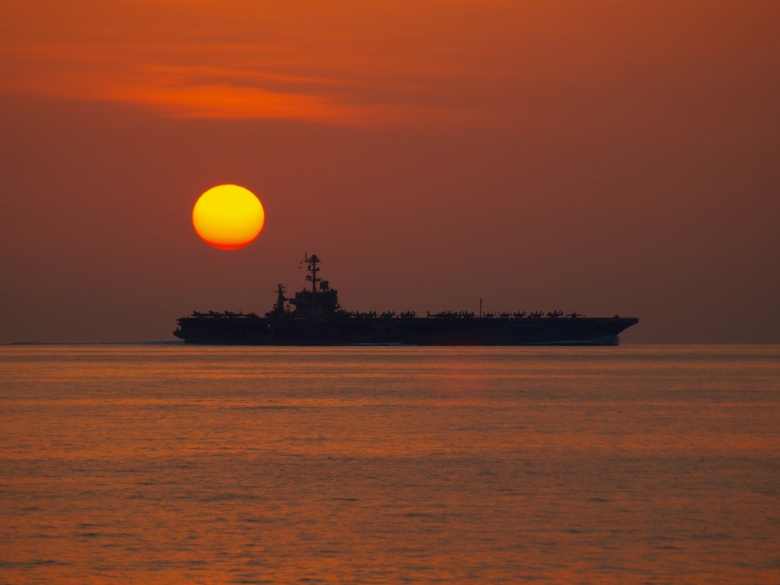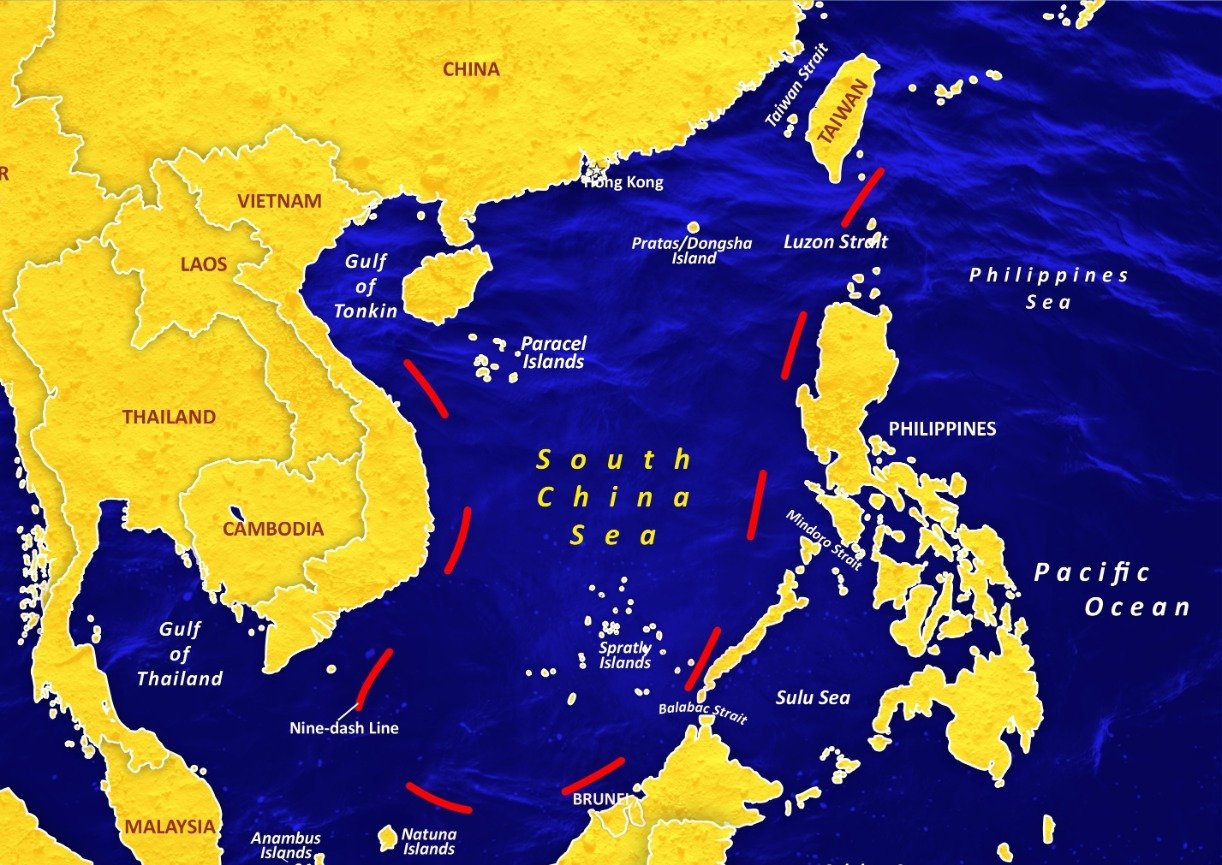Is the South China Sea War of 2023 About to Begin?

Territorial disputes in the South China Sea aren't new, and as early as the late 18th century, tensions have flared over the waters. Trouble could be brewing yet again as China's rise changes regional dynamics.
Territorial disputes in the South China Sea aren't new, and as early as the late 18th century tensions have flared over the waters. In the years leading up to the Second World War, there were competing claims to the Paracel and Spratly Islands – and the islands were occupied by the Japanese during the conflict.
The subsequent Treaty of San Francisco, signed in September 1951, failed to specify the new status of those islands, but both the Republic of China (RoC) – more commonly known as Taiwan – and the People's Republic of China (PRC) claim them. The islands are within the latter's current "ten-dash line" map, even as the Geneva Accords of 1954 gave South Vietnam control of the Paracels and Spratlys.
Of course, the disputes go far beyond the small patches of land – this is really about the control of the South China Sea, which is believed to be rich in oil and natural gas deposits. It is home to fishing grounds that provide the livelihoods of millions of people throughout the region, with more than half of the world's fishing vessels operating in the area.
Moreover, the waters continue to be a major shipping route, and in 2016, more than 40 percent of Beijing's total trade transited the South China Sea. The United Nations Conference on Trade and Development estimated that over 21 percent of global trade, amounting to $3.37 trillion, also traveled through the waters.
As early as the 1970s, countries in the region began to claim the islands and various zones in the South China Sea.
Is a Sino-Filipino War Brewing in the South China Sea?
While there have been growing concerns that the United States and China could face off in the Indo-Pacific, it is increasingly possible that a flare-up could begin first between China and the Philippines, which have nearly come to blows over the waters.
The tensions began in February when Chinese personnel flashed a military-grade laser at a Philippine Coast Guard vessel approaching the Second Thomas Shoal, temporarily blinding its crew.
Multiple times this year, China has sent swarms of coast guard, navy, and militia vessels to block off Filipino fishing vessels, while in August Chinese first employed a water cannon against a Philippine ship that was resupplying marines onto the Sierra Madre, an outpost on a rusting ship that was run aground on the Second Thomas Shoal to support the Philippine claim. Just weeks after that water cannon incident, the Philippines cut a floating barrier that was blocking access to a traditional fishing ground.
Earlier this month, China reportedly employed water cannons eight times on a Filipino fishing vessel – which Manila said endangered the lives of the crew while it damaged the vessel.

On Sunday, a Philippine boat and a Chinese Coast Guard ship collided near a contested reef in the South China Sea, and both countries are placing the blame on each other.
Washington called for Beijing to halt its "dangerous and destabilizing" actions in the disputed South China Sea after a Philippine boat and a Chinese Coast Guard ship collided near a contested reef. The UK's government on Monday also condemned the "unsafe and escalatory tactics deployed by Chinese vessels" against the Philippines.
"The UK opposes any action which raises tensions, including harassment, unsafe conduct, and intimidation tactics which increase the risk of miscalculation and threaten regional peace and stability," the foreign office said in a statement.
South China Sea Crisis: More Than Just Fish and Oil
Though the resources are a crucial component of the competing claims, Beijing also maintains that under international law, foreign militaries are not able to conduct intelligence-gathering activities, such as reconnaissance flights, in its exclusive economic zone (EEZ).
At issue is that the claims to the Paracel and Spratly Islands – which China maintains have been part of its territory since the Middle Ages – would put nearly the entirety of the South China Sea under Beijing's control.
According to the United States, claimant countries, under the UN Convention of the Law of the Sea (UNCLOS), should have freedom of navigation through EEZs in the sea and therefore are not required to notify claimants of military activities.
As the Council of Foreign Relations warned in June, "Washington's defense treaty with Manila could draw the United States into a potential China-Philippines conflict over the substantial natural gas deposits or lucrative fishing grounds in disputed territory. The failure of Chinese and Southeast Asian leaders to resolve the disputes by diplomatic means could also undermine international laws governing maritime disputes and encourage destabilizing arms buildups."
And Then There is Taiwan
The other part of the equation is that the Chinese Communist Party (CCP) in Beijing maintains that the self-governing island of Taiwan is a breakaway province that will be returned to mainland control and by force if necessary. However, the CCP has never actually ruled over the island since coming to power in 1949 at the end of the Chinese Civil War when the Nationalist forces fled to the island.
The United States does have formal diplomatic ties with Taiwan, but it has a robust unofficial relationship. Taiwan-US relations are also formally guided by the service of enactment of the Taiwan Relations Act by the U.S. Congress for the continuation of Taiwan-U.S. relations after 1979.

Beijing has steadily increased its saber-rattling in regards to its claims on Taiwan, and some U.S. military officials have expressed an opinion that China will launch an invasion to "regain" control by the end of the decade. There have been three so-called "Taiwan Strait Crises," with the most recent occurring in 1996. In each case, cooler heads prevailed, but a fourth crisis, which already seems to be brewing could be a tipping point.
China is facing an economic decline, a population implosion, and a demographic dilemma where its gender balance is skewed with more men than women.
It is also a nation constrained by resource scarcity, and it may see a regional conflict as its only hope to maintain its standing, or else its goal to become a major world power will fade. Instead of being a sleeping dragon ready to awaken, it could be a behemoth whose time simply came and went.
Author Experience and Expertise
Peter Suciu is a Michigan-based writer. He has contributed to more than four dozen magazines, newspapers, and websites with over 3,200 published pieces over a twenty-year career in journalism. He regularly writes about military hardware, firearms history, cybersecurity, politics, and international affairs. Peter is also a Contributing Writer for Forbes and Clearance Jobs. You can follow him on Twitter: @PeterSuciu.
All images are Shutterstock.
No comments:
Post a Comment